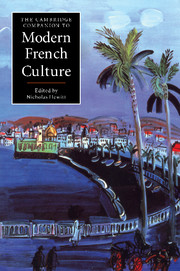Book contents
- Frontmatter
- Introduction: French culture and society in the twentieth century
- 1 Modern France: history, culture and identity, 1900-1945
- 2 Culture and identity in postwar France
- 3 Architecture, planning and design
- 4 The mass media
- 5 Consumer culture: food, drink and fashion
- 6 Language: divisions and debates
- 7 Intellectuals
- 8 Religion, politics and culture in France
- 9 The third term: literature between philosophy and critical theory
- 10 Narrative fiction in French
- 11 Poetry
- 12 Theatre
- 13 Music
- 14 The visual arts
- 15 Cinema
- Index
13 - Music
Published online by Cambridge University Press: 28 May 2006
- Frontmatter
- Introduction: French culture and society in the twentieth century
- 1 Modern France: history, culture and identity, 1900-1945
- 2 Culture and identity in postwar France
- 3 Architecture, planning and design
- 4 The mass media
- 5 Consumer culture: food, drink and fashion
- 6 Language: divisions and debates
- 7 Intellectuals
- 8 Religion, politics and culture in France
- 9 The third term: literature between philosophy and critical theory
- 10 Narrative fiction in French
- 11 Poetry
- 12 Theatre
- 13 Music
- 14 The visual arts
- 15 Cinema
- Index
Summary
When Charles Baudelaire, at the dawn of the French modernist period, wrote that music sometimes overwhelmed him like an ocean, he was heralding what would happen in France throughout the twentieth century. A musical map of France at the beginning of the period would have shown all sorts of geographical divisions and class hierarchies, with high art music the purview of a happy and wealthy urban few, regional musics retracting into provincial backwaters, and 'popular' forms of musical expression subject to the vagaries of the growing commercialisation of the music-halls. By the century's end, democratisation and technological advances had led to the breaking of all barriers. With the advent of radio, recording, cinema, television and the Internet, music of all kinds is simultaneously everywhere, giving individuals exponentially increasing choice in what they want to hear and when. For music-makers, too, the parameters have been infinitely extended: conventions of composition and harmony have dissolved; the potentials of sound production have been multiplied by the possibilities of electronic synthesis as well as by the recovery of ancient instruments; the spaces in which music can occur have become unlimited. France has not, of course, been alone in experiencing this revolution, and what it means in the French context is one measure - a significantly sensitive one - of the great changes that have swept the world in the modernist era.
- Type
- Chapter
- Information
- The Cambridge Companion to Modern French Culture , pp. 272 - 289Publisher: Cambridge University PressPrint publication year: 2003



